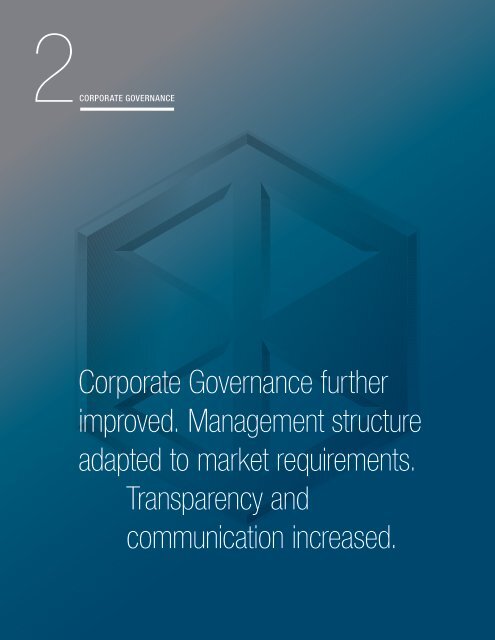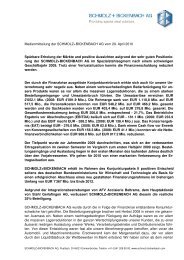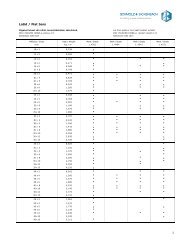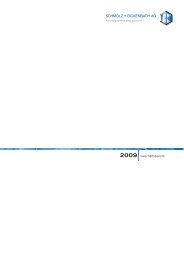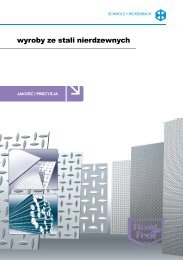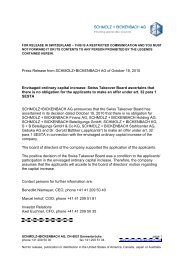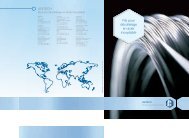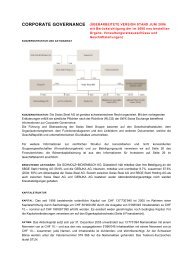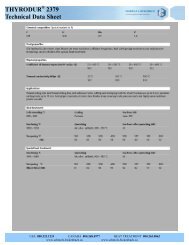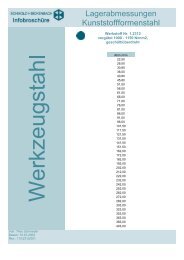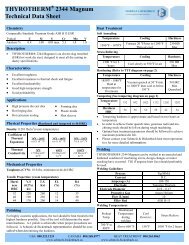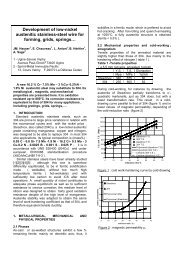Corporate Governance further improved. Management structure ...
Corporate Governance further improved. Management structure ...
Corporate Governance further improved. Management structure ...
Create successful ePaper yourself
Turn your PDF publications into a flip-book with our unique Google optimized e-Paper software.
2<strong>Corporate</strong> GovernanCe<br />
<strong>Corporate</strong> <strong>Governance</strong> <strong>further</strong><br />
<strong>improved</strong>. <strong>Management</strong> <strong>structure</strong><br />
adapted to market requirements.<br />
Transparency and<br />
communication increased.
54<br />
56<br />
58<br />
66<br />
71<br />
72<br />
72<br />
73<br />
73<br />
CoRpoRAte GoveRnAnCe<br />
Group <strong>structure</strong> and shareholders<br />
Capital <strong>structure</strong><br />
Board of Directors<br />
executive Committee<br />
Compensation, shareholdings<br />
and loans<br />
Shareholders’ rights<br />
Change of control and defensive<br />
measures<br />
Auditors<br />
Information policy<br />
54–73<br />
S+Bi Annual Report 2011 CoRpoRAte GoveRnAnCe<br />
53
54<br />
CoRpoRAte GoveRnAnCe<br />
* www.schmolz-bickenbach.com/en/<br />
i nvestor-relations/corporate-governance.<br />
In the reporting year the flow of information to the shareholders and the<br />
financial community was strengthened and the internal organisation of<br />
the Board of Directors was adapted to the new requirements. the growing<br />
requirements for <strong>Corporate</strong> <strong>Governance</strong> were taken into account with<br />
concrete measures.<br />
1 Group <strong>structure</strong> and shareholders<br />
1.1 Group <strong>structure</strong><br />
S+Bi AG is a company organised under Swiss law. Headquartered in emmen, the Company was<br />
first entered in the Commercial Register of the Canton of Lucerne on 20 September 1887 under the name Aktiengesellschaft<br />
der von Moosschen eisenwerke. the company number is CH100.3.010.6567.<br />
1.1.1 Group operating <strong>structure</strong><br />
the operating organisation is described in the segment reporting section of the consolidated financial statements.<br />
<strong>Management</strong> and supervision of the S+Bi Group are based on the Company‘s Articles of Incorporation*,<br />
organisational Regulations*, organisational charts, mission statement and other documents that set out the<br />
corporate policy and business principles.<br />
the management <strong>structure</strong> is aligned to the Group’s business strategy. As a global leader specialising in long products for<br />
the special and highgrade steel sector, the Group is organised in line with the value chain, subdivided into the production,<br />
processing and Distribution + Services divisions. thus, the Group’s operating <strong>structure</strong> is closely geared to markets<br />
and processes, to enable it to maintain and grow its leading position on the global market. the individual companies and<br />
divisions are shown on pages 126 and 127 of the Annual Report.<br />
1.1.2 Listed company<br />
name S+Bi AG<br />
Registered office emmenweidstrasse 90, emmen<br />
Listed on SIX Swiss exchange, Main Standard<br />
Market capitalisation CHF 633 million (Closing price as at 30 December 2011: CHF 5.36)<br />
Symbol StLn<br />
Securities no. 579 566<br />
ISIn CH000 579 566 8
S+Bi Annual Report 2011 CoRpoRAte GoveRnAnCe<br />
Group <strong>structure</strong> and shareholders<br />
1.1.3 Unlisted companies<br />
All Group companies are unlisted companies. A list of these companies is provided on pages 126 and 127 of the Annual<br />
Report along with their registered office, share capital and shareholding.<br />
1.2 Significant shareholders<br />
As at 31 December 2011, the following shareholders with holdings exceeding the threshold of 3% of the capital were known<br />
to the Company:<br />
31.12.2011 31.12.2010<br />
Shares % 1) Shares % 1)<br />
S+Bi Holding AG 2) 24 995 921 21.16 20 229 490 19.27<br />
S+Bi Finanz AG 2) 18 261 233 15.46 18 261 233 17.39<br />
S+Bi Beteiligungs GmbH 2) 7 784 693 6.59 3 018 263 2.87<br />
S+Bi GmbH & Co. KG<br />
and subsidiaries<br />
51 041 847 43.21 41 508 986 39.53<br />
GeBUKA AG 2) 7 090 000 6.00 5 460 000 5.20<br />
Citadel Group 3) n.a. < 3.00 4 567 257 4.35<br />
1) Percentage of shares issued as at 31 December.<br />
2) As announced on 4 May 2011.<br />
3) As announced on 9 February 2011.<br />
Shareholder <strong>structure</strong> as at 31.12.2011<br />
S+Bi<br />
GmbH & Co. KG, Düsseldorf (DE)<br />
100%<br />
S+Bi<br />
Beteiligungs GmbH & Co. KG, Düsseldorf (DE)<br />
100%<br />
S+Bi<br />
Beteiligungs GmbH<br />
Düsseldorf (DE)<br />
6.59%<br />
outstanding<br />
shares<br />
S+Bi AG<br />
100%<br />
S+Bi<br />
Finanz AG | Wil (CH)<br />
15.46% outstanding shares<br />
S+Bi<br />
Stahlcenter AG<br />
Wil (CH)<br />
100% 100%<br />
43.21%<br />
outstanding shares<br />
S+Bi<br />
Holding AG | Wil (CH)<br />
21.16% outstanding shares<br />
36.62%<br />
outstanding shares<br />
Shareholders<br />
agreement<br />
GeBUKA AG 1)<br />
neuheim (CH)<br />
6.00%<br />
outstanding<br />
shares<br />
Free Float<br />
50.79%<br />
outstanding<br />
shares<br />
1) Shares held by Dr. Gerold Büttiker, Member of the Board of Directors.<br />
55
56<br />
www.six-swiss-exchange.com/shares/<br />
companies/major_share holders_en.html<br />
S+Bi Holding AG and GeBUKA AG are parties to a shareholder agreement, under which the voting<br />
rights of the shares subject to the agreement are exercised uniformly. In addition to mutual purchasing and preemption rights,<br />
this shareholder agreement also governs representation on the Board of Directors of the Company, under the terms of which<br />
S+Bi Holding AG and GeBUKA AG may nominate an agreed number of members of the Board of<br />
Directors for the Company, with GeBUKA AG entitled to at least one seat and S+Bi Holding AG<br />
entitled to nominate the Chairman.<br />
During the business year, there were changes in the significant shareholders, which were notified to the Company as well as<br />
to the Disclosure office of SIX Swiss exchange AG. these can be inspected on the Internet.<br />
1.3 Cross-holdings<br />
the Company has no crossholdings with significant shareholders or other related companies.<br />
2 Capital <strong>structure</strong><br />
2.1 Capital<br />
Share capital<br />
As at 31 December 2011, the ordinary share capital of S+Bi AG amounted to CHF 413 437 500,<br />
divided into 118 125 000 registered shares with a nominal value of CHF 3.50 per share. All registered shares are fully paid<br />
up and there are no additional depositary obligations on the part of shareholders.<br />
Under the terms of the Articles of Incorporation, the General Meeting may at any time convert existing registered shares<br />
into bearer shares.<br />
2.2 authorised and conditional capital in particular<br />
the Company has authorised share capital of CHF 87 500 000, corresponding to 21.16% of the current share capital.<br />
In accordance with Art. 3b of the Articles of Incorporation, the Board of Directors is authorised to increase the share capital<br />
up to a maximum of CHF 87 500 000 at any time up to 15 April 2013, by issuing up to 25 000 000 bearer or registered<br />
shares to be fully paid up with a par value of CHF 3.50 per share. Capital increases by means of a firm underwriting, or<br />
increases in instalments, are permitted. the amount to be issued, the date of dividend entitlement, and the type of deposits<br />
are determined by the Board of Directors. the Board of Directors is authorised to exclude shareholders from subscription<br />
rights related to the acquisition of companies, business units or holdings and to assign such rights to third parties.<br />
newly acquired registered shares are subject to the restrictions on transfer in accordance with Art. 4 of the Articles of<br />
Incorporation.<br />
the Company has no conditional capital.<br />
2.3 Changes in capital<br />
there were no changes in the share capital in 2008 or 2009. As decided on 28 october 2010, in 2010 the share capital was<br />
reduced and simultaneously increased. the nominal value of the former 30 000 000 shares was first reduced from CHF 10<br />
to CHF 3.50 per share. the amount of the reduction was transferred to reserves. the share capital was simultaneously increased<br />
by more than the amount of the reduction by the issue of 75 000 000 shares with a nominal value of CHF 3.50 per<br />
share. As a result, as at 31 December 2010 the share capital of the Company comprised 105 000 000 registered shares<br />
with a nominal value of CHF 3.50 per share.
S+Bi Annual Report 2011 CoRpoRAte GoveRnAnCe<br />
Group <strong>structure</strong> and shareholders | Capital <strong>structure</strong><br />
As decided on 15 April 2011, in 2011 a <strong>further</strong> capital increase of CHF 45 937 500 took place by the issue of 13 125 000<br />
registered shares with a nominal value of CHF 3.50 per share. In the transaction, 4 231 044 shares were paid for in cash<br />
and 8 893 956 shares were offset against part of the hybrid capital that was outstanding on 31 December 2010. the<br />
remainder of the hybrid capital was repaid with part of the cash proceeds from the capital increase.<br />
2.4 Shares and participation certificates<br />
As at 31 December 2011, the share capital consisted of 118 125 000 registered shares with a par value of CHF 3.50 per<br />
share. the Company held no treasury shares at yearend or during the course of the year. each share entitles the holder to<br />
one vote. voting rights may only be exercised if the shareholder is registered in the Company‘s share register by the correct<br />
time as a shareholder with the right to vote. Registered shares are not securitised and are held in collective custody by SIX<br />
SAG AG. Shareholders are not entitled to request a printed copy of share certificates. every shareholder can, however, at<br />
any time request to receive from the Company certification of the shares in their ownership.<br />
S+Bi AG has not issued any participation certificates.<br />
2.5 Dividend rights certificates<br />
S+Bi AG has not issued any dividend right certificates.<br />
2.6 restrictions on transferability and nominee registration<br />
Certificated shares can be physically deposited with a depositary; paperless shares can be entered in the principal register<br />
of a depositary and credited to a securities account (creation of intermediated securities). Intermediated securities can only<br />
be disposed of, or given as security, according to the Swiss Federal Law on Intermediated Securities. paperless securities<br />
that do not qualify as intermediated securities can only be transferred by cession. For such cession to be valid, it must be<br />
notified to the company.<br />
In accordance with the Articles of Incorporation, persons acquiring registered shares may upon request be entered without<br />
restriction in the share register as a shareholder with voting rights if they expressly declare that they acquired the registered<br />
shares in their own name and on their own account. If no such declaration is made, nominees are registered with voting<br />
rights up to a maximum of 2% of the share capital. Beyond this limit, nominees with registered shares are registered with<br />
voting rights only if they provide a written declaration that they are prepared to disclose the addresses and shareholdings<br />
of persons on whose account they hold 0.5% or more of the outstanding share capital.<br />
except for the nominee clause there are no restrictions on transfer, nor are there any statutory privileges, so no derogations<br />
had to be granted in 2011. Revocation or amendment of these stipulations requires the agreement of at least two thirds of<br />
the represented votes and the absolute majority of the represented nominal share values.<br />
2.7 Convertible bonds and options<br />
As at 31 December 2011, the Company had no convertible bonds or options outstanding.<br />
SUCCeSSfUL<br />
CapitaL inCreaSe<br />
57
58<br />
Board of Directors<br />
Dr. Hans-Peter Zehnder (CH)<br />
1954, Chairman, Chairman<br />
of the Nomination and<br />
Compensation Committee<br />
Member since 1992<br />
Elected until 2013<br />
Manfred Breuer (DE)<br />
1951, Member of the Board<br />
Member since 2009<br />
Elected until 2012<br />
3 Board of Directors<br />
3.1 Members<br />
As at 31 December 2011, the composition of the Board of Directors was as follows.<br />
Benedikt Niemeyer (DE)<br />
1958, Delegate to<br />
the Board of Directors<br />
Member since 2003<br />
Elected until 2012<br />
Dr. Gerold Büttiker (CH)<br />
1946, Member of the Board,<br />
of the Audit Committee,<br />
and of the Nomination and<br />
Compensation Committee<br />
Member since 2003<br />
Elected until 2012<br />
Dr. Helmut Burmester (DE)<br />
1939, Member of the Board,<br />
of the Audit Committee,<br />
and of the Nomination and<br />
Compensation Committee<br />
Member since 2006<br />
Elected until 2012<br />
Benoît D. Ludwig (CH)<br />
1945, Member of the Board,<br />
of the Audit Committee,<br />
and since 2011 of the<br />
Nomination and<br />
Compensation Committee<br />
Member since 2003<br />
Elected until 2012<br />
Dr. Alexander von<br />
Tippelskirch (DE)<br />
1941, Member of the<br />
Board, Chairman of<br />
the Audit Committee<br />
Member since 2006<br />
Elected until 2012<br />
With the exception of the Delegate to the Board, all members of the Board of Directors are nonexecutive. Unless otherwise<br />
stated, the nonexecutive members of the Board have no significant business relationships with Group companies.
Dr. Hans-Peter Zehnder<br />
Chairman of the Board of Directors<br />
S+Bi Annual Report 2011 CoRpoRAte GoveRnAnCe<br />
Board of Directors<br />
Benedikt Niemeyer<br />
Delegate to the Board of Directors<br />
Dr. Hans-peter Zehnder<br />
Chairman – Non-executive member<br />
Dr. Hanspeter Zehnder has a doctorate in economics and social science from the University of St Gallen. He joined the<br />
Board of Directors in 1992 and served as viceChairman from 2001 to 2003, and from 2006 to 2011. Since December<br />
2011, he serves as Chairman of the Board of Directors. Since 2006 he has also been a member of the nomination and<br />
Compensation Committee, of which since 2011 he has been chairman. From 1981 to 1984 Dr. Hanspeter Zehnder worked<br />
for Gebr. Bühler AG (CH), and since 1985 has been a member of the executive Committee of Zehnder Group (CH), holding<br />
various functions. Since 1993 he has been Chairman of the executive Committee and Chairman of the Board of Directors<br />
of Zehnder Group AG. He is also a member of the Board of Directors of AZ Medien AG (CH), R. nussbaum AG (CH), Lagerhäuser<br />
der Centralschweiz AG (CH), and Rouge + Blanc AG (CH).<br />
Benedikt niemeyer<br />
Delegate to the Board of Directors – Executive member<br />
Benedikt niemeyer has degrees in engineering and business and was elected as Delegate to the Board at the extraordinary<br />
General Meeting in September 2006. At the same time he assumed the function of Chief executive officer,<br />
after serving as Chairman of the Board of Directors since joining the Company in 2003. Benedikt niemeyer worked for<br />
Mc Kinsey & Company between 1985 and 1992, latterly as Senior engagement Manager. From 1992 to 1999 he worked<br />
for Klöckner & Co. AG (De), most recently as a member of the <strong>Management</strong> Board. At the same time he also held a number<br />
of advisory and supervisory board mandates at Klöckner & Co. Group. From 1999 to 2001 he was Ceo of Schneider<br />
technologies AG (De). He is also a member of the Supervisory Board of Marquard & Bahls AG (De). Benedikt niemeyer<br />
was Ceo of S+Bi GmbH & Co. KG (De) from 2002 until 30 December 2011. He received separate<br />
compensation for this activity.<br />
59
60<br />
Manfred Breuer<br />
Non-executive member<br />
Dr. Gerold Büttiker<br />
Non-executive member<br />
Dr. Helmut Burmester<br />
Non-executive member<br />
Manfred Breuer<br />
Non-executive member<br />
Manfred Breuer, Chartered Banker, has been a member of the Board of Directors since 2009. Since 1969 he has been employed<br />
by Commerzbank, where he has held various managerial positions in Germany and in other countries. He is currently<br />
president of Commerzbank AG, Düsseldorf (De), and responsible for mediumsized companies. He is vicechairman of the<br />
north RhineWestphalia Banks Association (De), a member of the board of directors of the RWI (RhineWestphalia Institute<br />
for economic Research), essen (De), a member of the Advisory Board of nRWBank, Düsseldorf (De), and also holds <strong>further</strong><br />
positions and functions in various other associations and foundations.<br />
Dr. Gerold Büttiker<br />
Non-executive member<br />
Dr. Gerold Büttiker has a degree in civil engineering from the Swiss Federal Institute of technology and a doctorate in economics,<br />
and has been a member of the Board of Directors since 2003 and a member of the Audit Committee since 2004. Since 2009 he<br />
has also been a member of the nomination and Compensation Committee. As stated in Section 1.2, Dr. Gerold Büttiker indirectly<br />
owns 6.0% of the shares in S+Bi AG. Dr. Gerold Büttiker joined eternit Schweiz (CH) in 1975, where<br />
he held various management positions, and from 1985 to 1993 was Ceo of nueva Holding AG (CH), formerly Schweizerische<br />
eternit Holding AG (CH). Since 1993 he has been an independent entrepreneur in the construction materials sector. He also<br />
serves on various boards of companies in the construction materials sector, and in the field of civil and agricultural engineering.<br />
Dr. Helmut Burmester<br />
Non-executive member<br />
Dr. Helmut Burmester has a degree in economics and a doctorate in politics, and has been a member of the Board and the<br />
Audit Committee since 2006. Since 2009 he has also been a member of the nomination and Compensation Committee.<br />
He started his career with ARAL AG in Bochum (De), and left the company as Ceo in 1992. He subsequently served as Ceo
Benoît D. Ludwig<br />
Non-executive member<br />
S+Bi Annual Report 2011 CoRpoRAte GoveRnAnCe<br />
Board of Directors<br />
Dr. Alexander von Tippelskirch<br />
Non-executive member<br />
of Klöckner & Co, Duisburg (De), vAW Aluminium AG, Bonn (De), and Howaldtswerke – Deutsche Werft GmbH in Kiel (De).<br />
Currently Dr. Helmut Burmester is a partner at one equity partners, a fullyowned subsidiary of Jp Morgan Chase. He is<br />
also a member of the Advisory Board of S+Bi GmbH & Co. KG (De) and serves on the supervisory<br />
boards of various German and international companies.<br />
Benoît D. Ludwig<br />
Non-executive member<br />
Benoît D. Ludwig has a degree in physics from the Swiss Federal Institute of technology and an MBA from InSeAD.<br />
He joined the Board of Directors in 2003, and has been a member of the Audit Committee since 2006 and, since 2011,<br />
a member of the nomination and Compensation Committee. Between 1972 and 1987 Benoît D. Ludwig worked for<br />
McKinsey & Company, holding various positions in different countries. Since 1988 he has managed his own management<br />
consultancy firm, until 2009 Ludwig & partner AG (CH) and since 2010 Ludwig Consulting AG (CH), as Chairman of the<br />
Board and Managing partner. He is also a member of the Board of Directors of Miniera AG (CH), Franke Artemis Holding<br />
AG (CH), and Chairman of the Board of Directors of Cambia Holding AG (CH).<br />
Dr. alexander von tippelskirch<br />
Non-executive member<br />
Dr. Alexander von tippelskirch has a degree in business and a doctorate in politics, and has been a member of the Board<br />
of Directors and Chairman of the Audit Committee since 2006. Dr. Alexander von tippelskirch joined IKB Deutsche Industriebank<br />
AG (De) in 1968, working initially at the bank‘s Stuttgart branch, then as branch manager in Hamburg from<br />
1975 to 1984. In 1984 he was appointed a member of the bank‘s <strong>Management</strong> Board in Düsseldorf, and from 1990<br />
to 2004 was Ceo of the Board of Managing Directors. Dr. Alexander von tippelskirch is also a member of the Advisory<br />
Board of S+Bi GmbH & Co. KG (De) and holds a number of advisory and supervisory mandates<br />
with mediumsized companies.<br />
61
62<br />
3.2 additional activities and related interests<br />
the above profiles of members of the Board of Directors provide information on their activities and commitments in addition<br />
to their functions at S+Bi AG.<br />
3.3 election and term of office<br />
the Board of Directors consists of five to nine members. the members are elected by the General Meeting of Shareholders<br />
in staggered elections for a term of up to four years, the term of office that was voted for at the elections in 2009 and<br />
2010 being only three years. the members are elected individually.<br />
In accordance with the organisational Regulations, the Board appoints from among its members a Chairman and a vice<br />
Chairman for each term of office, and designates a Secretary, who need not be a member of the Board.<br />
the ordinary term of office of a member of the Board of Directors terminates on expiry of the period of tenure.<br />
3.4 internal organisation<br />
In 2011 the Board of Directors convened five times to discuss current business. the meetings typically last four hours,<br />
and are normally attended by the members of the executive Board (Ceo, Coo and CFo). In the year under review, no<br />
external consultants were called upon for assistance. the Board of Directors is quorate when at least half of its members<br />
are present. For the public notarisation of decisions related to capital increases, only one member need be present (Art.<br />
651a, 652g, 653g Swiss Code of obligations (Co)). Decisions and elections require a simple majority of the votes cast.<br />
Abstentions do not count as votes cast. In the event of a tie, the Chairman has the casting vote. In urgent cases, decisions<br />
of the Board of Directors can also be made by correspondence and included in the minutes of the next meeting, provided<br />
that no member requests their verbal discussion.<br />
the Board of Directors has set up two committees from among its members:<br />
nomination and Compensation Committee (nCC)<br />
Members of this committee are Dr. Hanspeter Zehnder (Chairman), Dr. Gerold Büttiker (Member), Dr. Helmut Burmester<br />
(Member) and Benoît D. Ludwig (Member). In fiscal year 2011, the committee met three times. these meetings lasted<br />
between two and four hours. the duties and powers of the nCC are defined more specifically in a separate regulation;<br />
the committee is composed of at least three members of the Board of Directors.<br />
In particular, the nCC has the following duties:<br />
_ Determination of the principles for the selection of candidates for election or reelection to the Board of Directors;<br />
_ Determination of the principles for the selection of members of the executive Board;<br />
_ elaboration of proposals to the Board of Directors of the Company for the appointment of members of the executive<br />
Board;<br />
_ elaboration of proposals to the Board of Directors of the Company for personnel development and succession planning<br />
processes for the Group management;<br />
_ preparation of proposals to the Board of Directors of the Company for the principles of compensation of the members<br />
of the Board of Directors of the Company, the committees and the executive Board;<br />
_ In accordance with the principles decided by the Board of Directors of the Company, determination of the concrete<br />
compensation of the Members of the Board of Directors of the Company, the committees and the executive Board.<br />
the nCC is responsible for informing the full Board of Directors on the content and scope of decisions made.
S+Bi Annual Report 2011 CoRpoRAte GoveRnAnCe<br />
Board of Directors<br />
audit Committee (aC)<br />
Members: Dr. Alexander von tippelskirch (Chairman), Dr. Helmut Burmester (Member), Benoît D. Ludwig (Member) and<br />
Dr. Gerold Büttiker (Member). the Audit Committee convened three times in 2011. the external auditors attended two<br />
meetings, and the internal auditors attended one meeting. the Group Risk Manager was present at one meeting. the<br />
meetings typically last from two to three hours. the tasks and responsibilities of the AC are drawn up in more detail in<br />
a separate regulation. the regulation includes a stipulation that the AC should consist of at least three members of the<br />
Board of Directors, who must not be actively involved in the company‘s business activities. the main tasks of the AC are<br />
as follows:<br />
financial reporting<br />
_ Appraising and monitoring the efficiency of the reporting system (financial reporting standard IFRS) of the Group, the<br />
efficiency of the financial information and the necessary internal control instruments;<br />
_ Assuring adherence to the accounting policies of the Group and appraising the effects of departures.<br />
external auditors (ea)<br />
_ participation in proposals to the Board of Directors for the selection and appointment of the external auditors;<br />
_ Review and approval of the audit plan;<br />
_ evaluation of the performance, compensation and independence of the external auditors;<br />
_ evaluation of the collaboration with Internal Auditing.<br />
internal auditing (ia)<br />
_ participation in the selection of Internal Auditing and its tasks;<br />
_ evaluation of the performance of Internal Auditing;<br />
_ Review and approval of the audit plan;<br />
_ evaluation of the collaboration with the external auditors.<br />
<strong>further</strong> duties<br />
_ evaluation of the internal control and information system;<br />
_ Receipt and discussion of the annual report on important, impending, pending, and closed legal cases with significant<br />
financial consequences;<br />
_ verbal and written reporting to the Board of Directors;<br />
_ Reviewing the measures to prevent and detect fraud, illegal activities, and conflicts of interest.<br />
the Audit Committee is also responsible for submitting regular verbal and written reports to the full Board of Directors.<br />
In addition to members of the Audit Committee, meetings are regularly attended by the Ceo and the member of the<br />
executive Board responsible for financial and Group accounting in an advisory capacity. Representatives of the internal<br />
and external auditors attend depending on the subject under discussion. the Chairman of the Board of Directors is entitled<br />
to attend in a guest capacity.<br />
63
64<br />
* www.schmolz-bickenbach.com/en/<br />
investor-relations/corporate-governance<br />
3.5 responsibility and authority<br />
the Board of Directors is the highest governing body in the Group management <strong>structure</strong>, and rules on all matters that<br />
are not expressly entrusted to another governing body under law, the Articles of Incorporation* or the organisational<br />
Regulations*.<br />
the Board of Directors has delegated all tasks which are not assigned to it under law as nontransferable and irrevocable.<br />
the following tasks in particular constitute nontransferable and irrevocable tasks of the Board of Directors:<br />
_ overseeing the company and issuing the requisite directives;<br />
_ Defining the organisation of the Company;<br />
_ Structuring the accounting, financial controls and financial planning to the extent required for management of the<br />
company;<br />
_ Appointing and dismissing persons entrusted with the management and representation of business;<br />
_ Supervising persons entrusted with business management, in terms of compliance with the law, Articles of Incorporation,<br />
company regulations and directives;<br />
_ Drawing up the Annual Report, preparing und leading the General Meeting, and implementing its decisions;<br />
_ notifying the court in the event of overindebtedness;<br />
_ Deciding on the payment of subsequent contributions to nonfully paidup shares;<br />
_ Deciding on the level of capital increases and the associated amendments to the Articles of Incorporation;<br />
_ other nontransferable and inalienable duties, for example in relation to the Swiss Merger Law (FusG).<br />
the Board of Directors represents the highest governing body of the Company, supervises and controls the executive<br />
Board, and issues guidelines on business policy. It also defines the strategic objectives and general resources required to<br />
achieve them. All executive management tasks within the company and the Group which are not reserved for the Board of<br />
Directors or its committees are assigned to the executive Board. the Ceo chairs the executive Board, which consists of<br />
the Ceo, Coo and CFo. He issues supplementary guidelines governing the tasks and authorities of members of the executive<br />
Board and Business Unit <strong>Management</strong>. the Board of Directors is notified of these responsibilities and any subsequent<br />
changes no later than the next Board of Directors meeting. Members of the executive Board are appointed by the Board of<br />
Directors on the recommendation of the nomination and Compensation Committee, while other members of management<br />
(including Business Unit heads) are appointed by the executive Board. the Chairman of the Board of Directors monitors<br />
the implementation of measures approved by the Board of Directors, supervises the Ceo and his activities, and conducts<br />
regular performance appraisals with him.<br />
3.6 <strong>Management</strong> information and controlling instruments<br />
the management information and controlling function used by the Board of Directors to control the executive Board and<br />
the Business Unit <strong>Management</strong> includes a transparent management information system (MIS) which produces monthly,<br />
quarterly and endofyear reports on Group and business segment performance. every member of the Board of Directors<br />
may request information about any and all Company matters after informing the president of the executive Board to<br />
this effect. the executive Board informs the Board of Directors at every meeting on current business developments and<br />
significant business transactions. outside meetings, all members of the Board of Directors can request from the executive<br />
Board information about the progress of business and, with the authorisation of the Chairman, also about individual<br />
business transaction.
S+Bi Annual Report 2011 CoRpoRAte GoveRnAnCe<br />
Board of Directors<br />
internal auditing<br />
Internal Auditing is an independent monitoring and advisory body. Administratively, it is assigned to the department of the<br />
Chief Financial officer. Its duties are defined by the Audit Committee with the participation of the executive Board. the<br />
internal auditors produce risk analyses and assess the effectiveness and efficiency of the internal control system; they<br />
represent an important component of enterprise Risk <strong>Management</strong>. the Board of Directors and the Audit Committee are<br />
regularly informed about the findings of enterprise Risk <strong>Management</strong>.<br />
In the year under review the internal auditors conducted several audits and analyses, which were discussed by the Audit<br />
Committee. to the extent required, the Audit Committee authorised the requisite measures and is monitoring their implementation<br />
in conjunction with the responsible Group and Business Unit heads.<br />
enterprise risk <strong>Management</strong> (erM)<br />
the Group’s risk policy is geared towards systematically increasing corporate value and achieving the planned corporate<br />
objectives. the policy takes into account appropriate, transparent and manageable risks. If the risks become too<br />
great, the risk management team assesses whether and how the risks can be transferred to third parties. the individual<br />
subgroups implement rules of conduct and guidelines and monitor their compliance and control. Speculative or other<br />
transactions with high risk potential are not permitted. our conduct towards suppliers, customers and Group companies<br />
is fair and responsible.<br />
Under the leadership of S+Bi AG, a standardised Groupwide eRM is deployed to ensure a cohesive<br />
framework within which risks can be managed systematically and efficiently. the aim of the eRM is to ensure that risk<br />
positions are identified and optimised and that opportunities are exploited. Direct responsibility for the early identification,<br />
monitoring and communication of risks lies with operational management, while responsibility for controls lies with the<br />
executive Board and ultimately the Board of Directors.<br />
Following the conclusion of insurance contracts, most of the risks, to the extent that they were insurable and it was commercially<br />
beneficial, were transferred to the insurers. preventive measures to avert losses have been implemented by<br />
the operating units. the eRM covers currency, interestrate and credit risk management. For treatment of the available<br />
instruments, we refer among other things to the information on “Financial Instruments” in the notes to the consolidated<br />
financial statements.<br />
to ensure that Itsupported business processes within the Group and with customers, suppliers and business partners<br />
are run professionally, the underlying information technologies are regularly reviewed and adapted. existing information<br />
security measures are continually updated so as to eliminate or at least minimise the risks associated with It processes.<br />
the volatility of steel prices and the Group‘s economic dependence on the automobile and mechanical engineering<br />
industries exert a significant influence on the Group’s business performance. the Group balances risks by continually<br />
developing its broad product portfolio and by internationalising its sales focus, or spreading the business portfolio and<br />
focussing on niche products and optimising the value chain.<br />
See “Opportunities<br />
and risks”, p. 45<br />
65
66<br />
Executive Board<br />
Benedikt Niemeyer (DE)<br />
Year of Birth 1958<br />
Chief Executive Officer<br />
Joined: 2003<br />
Business Unit <strong>Management</strong><br />
Carlo Mischler (CH)<br />
Year of Birth 1958<br />
Business Unit Head<br />
Swiss Steel AG<br />
Joined: 1998<br />
Gerd Münch (DE)<br />
Year of Birth 1962<br />
Business Unit Head<br />
Steeltec AG<br />
Joined: 1991<br />
4 executive Committee<br />
4.1 Members of the executive Committee<br />
the executive Committee consists of the executive Board and Business Unit <strong>Management</strong>.<br />
Peter Schubert (DE)<br />
Year of Birth 1958<br />
Business Unit Head<br />
S+<br />
Bi<br />
Blankstahl<br />
Joined: 1991<br />
Dr. Marcel Imhof (CH)<br />
Year of Birth 1948<br />
Chief Operating Officer<br />
Joined: 1977<br />
Jürgen Horsthofer (DE) 1)<br />
Year of Birth 1958<br />
Business Unit Head<br />
Deutsche Edelstahl -<br />
werke GmbH<br />
Joined: 1986<br />
Patrick Lamarque<br />
d’Arrouzat (FR)<br />
Year of Birth 1965<br />
Business Unit Head<br />
Ugitech S.A.<br />
Joined: 1990<br />
Bernd Grotenburg (DE)<br />
Year of Birth 1964<br />
Business Unit Head<br />
S+<br />
Bi<br />
Distribution Germany<br />
Joined: 1985<br />
Axel Euchner (DE)<br />
Year of Birth 1961<br />
Chief Financial Officer<br />
Joined: 2003<br />
Bruce C. Liimatainen (US)<br />
Year of Birth 1956<br />
Business Unit Head<br />
A. Finkl & Sons Co.<br />
Joined: 1977<br />
Thiery Crémailh (FR)<br />
Year of Birth 1961<br />
Business Unit Head<br />
S+<br />
bi<br />
Distribution International<br />
Joined: 2007<br />
1) Since 1 Januar 2012. Until his retirement on 31 December 2011, Karl Haase held the function of Business Unit Head Deutsche edelstahlwerke GmbH.
Benedikt Niemeyer<br />
Delegate to the Board of Directors<br />
and CEO<br />
executive Board<br />
Dr. Marcel Imhof<br />
COO<br />
Benedikt niemeyer<br />
Delegate to the Board of Directors and CEO<br />
See Section 3.1 (Members of the Board of Directors) on page 59.<br />
S+Bi Annual Report 2011 CoRpoRAte GoveRnAnCe<br />
executive Committee<br />
Axel Euchner<br />
CFO<br />
Dr. Marcel imhof<br />
COO<br />
Dr. Marcel Imhof has a doctorate in economics and social science from the University of St Gallen. He joined the Company<br />
in 1977 and was appointed Ceo of the Swiss Steel Group in 1996. Following the reorganisation in 2006, he took over the<br />
new function of Coo. Between 1978 and 1986 he was Head of Bright Steel Sales and from 1987 to 1991 Head of Rolled<br />
Steel Sales. From 1992 to 1996 he was Head of the Steel Division within the Group. Dr. Marcel Imhof is also a member of<br />
the Board of Directors of Ultra Brag AG (CH), Imbach AG (CH), and serves on the boards of a number of industrial and trade<br />
associations.<br />
axel euchner<br />
CFO<br />
Axel euchner has a degree in business and has been CFo of S+Bi AG since May 2005. From 1984<br />
to 1992 he worked as a tax consultant at pricewaterhouseCoopers (De) and from 1993 to 2000 as financial director of GeA<br />
AG (De). In 2001 he took over the function of CFo of the S+Bi Group, whose parent company at<br />
that time was S+Bi KG and, under the name S+Bi GmbH & Co KG, still<br />
is. He continues to perform this function, for which he is separately compensated. Between 2003 and May 2005 he was also<br />
a member of the Board of Directors of Swiss Steel AG.<br />
67
68<br />
Carlo Mischler<br />
Business Unit Head<br />
Swiss Steel AG<br />
Business Unit <strong>Management</strong><br />
Jürgen Horsthofer<br />
Business Unit Head<br />
Deutsche Edelstahlwerke GmbH<br />
Patrick Lamarque d’Arrouzat<br />
Business Unit Head<br />
Ugitech S.A.<br />
Carlo Mischler<br />
Carlo Mischler took over as Ceo of Swiss Steel AG on 1 April 2011. He holds a degree in engineering from the Swiss<br />
Federal Institute of technology (etH) and has worked for our Group since 1998, most recently as Head of Marketing<br />
and Sales. He continues to hold this function in parallel with his new responsibilities. Carlo Mischler formerly worked for<br />
several years in technical sales with Werkzeugmaschinenfabrik oerlikonBührle before becoming Ceo of a newly<br />
established small company in the field of boiler systems.<br />
Jürgen Horsthofer<br />
Jürgen Horsthofer took over as Ceo of Deutsche edelstahlwerke GmbH on 1 January 2012. From 2005, he held various<br />
executive management functions in the technical and distribution area of Deutsche edelstahlwerke GmbH. He previously<br />
held management functions in production and distribution in the predecessor company of Deutsche edelstahlwerke<br />
GmbH.<br />
After studying and graduating with a degree in engineering at the RWtH University Aachen, Jürgen Horsthofer spent three<br />
years with brass manufacturer Diehl GmbH & Co KG.<br />
patrick Lamarque d’arrouzat<br />
patrick Lamarque d’Arrouzat holds a master‘s degree in economics from the University of Bordeaux and an MBA from<br />
InSeeC International Business School (France and USA). He first joined the Arcelor Group in Italy in 1988, where he<br />
took up a managerial position at the subsidiary Uginox. Since 1990 he has worked for Ugitech, until 2000 mainly in<br />
commercial and marketing services. this was followed by four years in Spain, where until 2004 he was in charge of the<br />
commercial distribution network specialised in stainless steel long products. He subsequently took over responsibility<br />
for the bar steel business segment including the cold finishing shops, before being appointed Commercial Director of<br />
the Ugitech Group in 2007. He has been Ceo of the Ugitech Group since october 2008.
Bruce C. Liimatainen<br />
Business Unit Head<br />
A. Finkl & Sons Co.<br />
Gerd Münch<br />
Business Unit Head<br />
Steeltec AG<br />
S+Bi Annual Report 2011 CoRpoRAte GoveRnAnCe<br />
executive Committee<br />
Bruce C. Liimatainen<br />
Bruce C. Liimatainen has a degree in mechanical engineering with advanced studies in metallurgy and materials and has<br />
been Chairman and Ceo of A. Finkl & Sons Co. since 2002. He has served the company in various functions, beginning<br />
his career as a project engineer. He joined the Board of Directors in 1986, and advanced to the position of president in<br />
1988. prior to his career at A. Finkl & Sons Co., Liimatainen worked at U.S. Steel and Lockport Steel Fabricators. He holds<br />
several patents for the treatment of molten steel and other operations. Liimatainen has received multiple environmental<br />
awards, is a founding Board of Directors member of the Chicago environmental Fund, and is a recognised civic leader in<br />
Chicago.<br />
Gerd Münch<br />
Gerd Münch has a degree in metallurgy from the RheinischWestfälische technische Hochschule Aachen, and has been<br />
Ceo of Steeltec AG since 1 January 2006. From 1991 to 1996 he worked as a development engineer for the Bright Steel<br />
Division. In 1996 he transferred to Bright Steel production, initially as Head of production planning and Logistics, and in<br />
1997 took over as Head of production.<br />
peter Schubert<br />
After studying and graduating with a degree in engineering at the Bergakademie Freiberg, from 1985 to 1991 peter Schubert<br />
worked for Stahl und Walzwerk Hennigsdorf, finally as Head of the Bright Steel production Department. Since 1991<br />
he has worked for the S+Bi Group in various positions, and in January 2003 was appointed<br />
Ceo of S+Bi Blankstahl GmbH. Since 2009 he has also been Chief technical officer of<br />
S+Bi Distributions GmbH.<br />
Peter Schubert<br />
Business Unit Head<br />
S+Bi Blankstahl<br />
69
70<br />
Thiery Crémailh<br />
Business Unit Head<br />
S+Bi<br />
Distribution International<br />
Bernd Grotenburg<br />
Business Unit Head<br />
S+Bi<br />
Distribution Germany<br />
thiery Crémailh<br />
thiery Crémailh graduated from the engineering school of ecole Centrale paris. He started his career as an R&D engineer<br />
with Westhinghouse in the US and then embarked on 10 years of consulting in strategy and marketing for industrial<br />
companies mainly in paris and Madrid. In 1999, he joined Usinor (now ArcelorMittal) as Strategy vice president of J&L<br />
(Stainless steel) in pittsburgh, then became president and Ceo of techalloy in new York and M&A vice president of<br />
ArcelorMittal in Shanghai. He joined the s+bi Group in 2007 at Ugitech as Sales Director and<br />
was appointed in January 2011 Ceo of S+BI Distribution International.<br />
Bernd Grotenburg<br />
Bernd Grotenburg, MBA, has been working for the S+BI Group since 1985 and during this time<br />
has held various positions in Germany and in other countries. Immediately prior to his appointment as Business Unit Head<br />
Distribution Germany he was a member of the management board of Deutsche edelstahlwerke GmbH.
S+Bi Annual Report 2011 CoRpoRAte GoveRnAnCe<br />
executive Committee | Compensation, shareholdings and loans<br />
4.2 additional activities and related interests<br />
Until 30 December 2011, Benedikt niemeyer (Ceo) also performed the Ceo function for the majority partner S+<br />
Bi GmbH & Co. KG, Düsseldorf (De), and was separately compensated for this activity.<br />
Axel euchner (CFo) also performs the CFo function for the majority partner S+Bi GmbH & Co. KG,<br />
Düsseldorf (De), and is separately compensated for this activity. A total of eUR 365 000 was paid to them for 2011.<br />
4.3 <strong>Management</strong> agreements<br />
S+Bi edelstahl GmbH (De), a subsidiary of S+Bi AG provides services for<br />
the Group companies of S+Bi AG and for other companies which are affiliated with S+<br />
Bi GmbH & Co. KG (De), but are not part of S+Bi AG or its directly or indirectly<br />
controlled Group companies. these services are invoiced at market rates.<br />
5 Compensation, shareholdings and loans<br />
the nomination and Compensation Committee sets the fees for the Board of Directors and Board Committees as well as the<br />
compensation of the executive Board on an annual basis. the remaining members of the Board of Directors and the members<br />
of the executive Board do not attend these meetings. After each of its meetings, the Chairman of the nomination and<br />
Compensation Committee informs the Board of Directors of its decisions at its next meeting. In fiscal year 2011 a consultant<br />
was called upon to review the compensation programmes and submit proposals for their amendment. the compensation of<br />
the Business Unit <strong>Management</strong> is determined by the executive Board.<br />
nonexecutive members of the Board of Directors are paid fixed compensation in cash, which is defined by the Board of<br />
Directors at its own discretion, based on a comparison with similar Swiss public corporations in the industrial sector.<br />
the executive member of the Board of Directors and the members of the executive Board and Business Unit <strong>Management</strong><br />
receive fixed and variable compensation in cash.<br />
Strategic and projectrelated MBodependent components as well as Group business performance are the criteria used to<br />
determine the variable compensation of the executive Board. In addition, a financial incentive is offered in the form of a<br />
premium for successful acquisitions or divestments. For successful business performance and individual achievement, the<br />
variable component may be much higher than the fixed component.<br />
the criteria for the Business Unit <strong>Management</strong> are the eBIt results of the respective business segments and the personal<br />
qualityrelated goals.<br />
the nomination and Compensation Committee is responsible for ensuring that the company offers competitive, performancedriven<br />
compensation in order to attract and retain employees with the right skill sets and character traits. the compensation<br />
must be based on the company‘s sustainable success and dependent on personal effort.<br />
Key factors for determining the variable compensation of the executive Member of the Board of Directors, and of the other<br />
members of the executive Board, in 2011 were:<br />
_ positive business development and substantially increased earnings (eBt)<br />
_ successful refinancing<br />
the large number of positive effects were evaluated overall at the discretion of the nomination and Compensation Committee<br />
without specific weighting of individual goals, with additional consideration also being given to the eBIt development and the<br />
individual contribution to overall performance and operational leadership.<br />
See p. 136 / 137<br />
71
72<br />
For the executive Member of the Board of Directors, the variable compensation was 111% of the fixed salary component, and<br />
for the other members of the executive Board, 43% of the fixed salary component.<br />
In addition, members of the Group and Business Unit <strong>Management</strong> are entitled to a company car. In 2011, no loans were<br />
granted to members of the Board of Directors, the executive Board or the Business Unit <strong>Management</strong>.<br />
In December 2011, Michael Storm resigned as Chairman and member of the Board of Directors. In 2011, his compensation of<br />
eUR 992 868 was recognised as an expense.<br />
no other payments were made to former members of governing bodies.<br />
6 Shareholders’ rights<br />
6.1 restrictions on shareholders’ rights and shareholder representation<br />
With the exception of the 2% clause for nominees, there are no restrictions on voting rights.<br />
According to Art. 6 para. 2 of the Articles of Incorporation, any shareholder may be represented with written power of attor ney<br />
by any other person who need not be a shareholder.<br />
6.2 Statutory Quora<br />
the Articles of Incorporation contain no special provisions governing quora beyond the provisions of company law.<br />
6.3 Convocation of the General Meeting<br />
the General Meeting is convened by the Board of Directors or the auditors, indicating the agenda as well as proposals of the<br />
Board of Directors and motions put forward by shareholders who have requested that the General Meeting be held or that<br />
an item be included on the agenda. the meeting is held at the registered office of the Company or at a different location<br />
determined by the Board of Directors.<br />
A written invitation is sent at least 20 days before the date of the General Meeting, which must take place within six months<br />
of the end of the financial year, or the extraordinary General Meeting, which is convened either by a resolution of the General<br />
Meeting or of the Board of Directors, at the request of the auditors, or if requested by one or more shareholders who together<br />
represent at least one tenth of the share capital (see Art. 5 of the Articles of Incorporation).<br />
If the meeting is convened by shareholders or the auditors, the Board of Directors must, if expressly requested, address the<br />
matter within 60 days.<br />
6.4 placing items on the agenda<br />
Shareholders who represent shares with a par value of CHF 1 million may submit a written request, no later than 45 days<br />
before the General Meeting, asking for an item to be placed on the agenda.<br />
6.5 entry in the share register<br />
the cutoff date for entering registered shareholders in the share register is indicated in the invitation to the General<br />
Meeting. It is normally around 10 calendar days before the date of the General Meeting.<br />
7 Change of control and defensive measures<br />
7.1 obligation to make a public offer<br />
there are no statutory provisions on opting out or opting up.
S+Bi Annual Report 2011 CoRpoRAte GoveRnAnCe<br />
Compensation, shareholdings and loans | Shareholder’s rights | Change of control and defensive measures |<br />
Auditors | Information policy<br />
7.2 Change of control clauses<br />
Benedikt niemeyer (Delegate to the Board of Directors and Ceo) and Axel euchner (CFo) have signed contracts of employment<br />
for a fixed term up to 30 September 2014. Unless notice is served on these contracts at least two years before the<br />
defined expiry date, they are automatically renewed for another five years. Dr. Marcel Imhof (Coo) has a contract of employment<br />
for a fixed term up to 31 January 2013.<br />
8 Auditors<br />
8.1 Duration of mandates and term of office of the lead auditor<br />
the auditors are elected by the General Meeting for a period of one year. ernst & Young Ltd has performed this function<br />
since fiscal year 2005 and was reelected for fiscal year 2011. Daniel Wüst has been the engagement partner since the<br />
auditors were first elected.<br />
8.2 auditing fees<br />
In 2011, in association with the audit, payments were made of eUR 1.6 million (2010: eUR 1.5 million) for the audit of the<br />
annual financial statements, and eUR 0.3 million (2010: eUR 0.5 million) for other assurance services.<br />
8.3 additional fees<br />
payments for additional services were made in the reporting year of eUR 1.3 million (2010: eUR 0.9 ) for tax consultancy<br />
services and eUR 0.3 million (2010: eUR 0.3 million) for miscellaneous services.<br />
8.4 Supervisory and control instruments vis-a-vis the auditors<br />
the Audit Committee annually reviews the performance, fees and independence of the auditors and makes a proposal to the<br />
Board of Directors, and ultimately the General Meeting, concerning the appointment of the statutory and Group auditors.<br />
the Audit Committee decides annually on the scope of the internal audit and coordinates this with the schedules drawn up by<br />
the external auditors. the Audit Committee agrees the audit scope and plan with the external auditors and discusses the audit<br />
findings with the external auditors, who regularly attend two meetings per year (see also the detailed description of the tasks<br />
and competences of the Audit Committee, Section 3.4, on page 63).<br />
there is no definitive rule governing the rendering of nonaudit services; these mandates are generally issued by the executive<br />
Board after consultation with the Chairman of the Audit Committee, and are evaluated annually as part of the review of the<br />
independence of the external auditors.<br />
9 Information policy<br />
An annual report is published once a year, and a semiannual report in August, both in German and english. the provisions<br />
relating to ad hoc publication also apply. the German version is binding.<br />
planned publication dates:<br />
Media/Analysts’ Conference: 7 March 2012 in Zurich<br />
ordinary General Meeting: 19 April 2012 in emmenbrücke<br />
Media/Analysts’ Conference: 22 August 2012 in Zurich<br />
investor relations:<br />
Axel euchner, Chief Financial officer, telephone: +41 41 209 50 35<br />
press releases and other information are available to the public on our website at<br />
www.schmolzbickenbach.com.<br />
73


